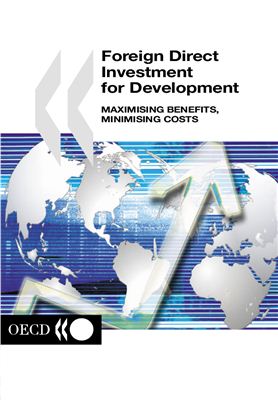This OECD report responds to the inteational community's
reinvigorated efforts to mobilise foreign direct investment in
support of development. The Doha Development Agenda, the Monterrey
Consensus, the New Partnership for Africa's Development, the 2002
OECD Ministerial and the Johannesburg World Summit all underscore
the importance of inteational investment in achieving sustainable
development goals and ensuring that poor countries are not left
behind and benefit from globalisation.
Foreign Direct Investment for Development represents the first comprehensive OECD study of the development dimensions of foreign direct investment (FDI). It is the result of extensive work and consultation by the OECD investment policy community on a wide number of issues, including:
* What is the impact of FDI on macroeconomic growth?
* What is the link with trade integration?
* How can FDI best contribute to technology diffusion and human capital formation in the local economy?
* Is FDI beneficial for sound competition, enterprise restructuring and corporate goveance?
* How does it affect social and environmental performance of the host countries?
* What are the policy requirements to maximise the benefits and minimise the costs of FDI?
While possible drawbacks of FDI are reviewed, one of the main findings of the report is that the benefits generally outweigh the costs by a wide margin. Yet the benefits of FDI do not accrue automatically. Policies matter greatly for developing countries' ability to reap fully these benefits. The report reviews main areas for consideration by policy-makers, together with supporting actions from developed countries and the role of responsible inteational business.
Building on this work and other similar initiatives, the OECD is committed to engaging non-member countries and civil society partners in experience sharing and dialogue to enhance the role of inteational investment as a catalyst for poverty alleviation in the world as a whole.
Foreign Direct Investment for Development represents the first comprehensive OECD study of the development dimensions of foreign direct investment (FDI). It is the result of extensive work and consultation by the OECD investment policy community on a wide number of issues, including:
* What is the impact of FDI on macroeconomic growth?
* What is the link with trade integration?
* How can FDI best contribute to technology diffusion and human capital formation in the local economy?
* Is FDI beneficial for sound competition, enterprise restructuring and corporate goveance?
* How does it affect social and environmental performance of the host countries?
* What are the policy requirements to maximise the benefits and minimise the costs of FDI?
While possible drawbacks of FDI are reviewed, one of the main findings of the report is that the benefits generally outweigh the costs by a wide margin. Yet the benefits of FDI do not accrue automatically. Policies matter greatly for developing countries' ability to reap fully these benefits. The report reviews main areas for consideration by policy-makers, together with supporting actions from developed countries and the role of responsible inteational business.
Building on this work and other similar initiatives, the OECD is committed to engaging non-member countries and civil society partners in experience sharing and dialogue to enhance the role of inteational investment as a catalyst for poverty alleviation in the world as a whole.

